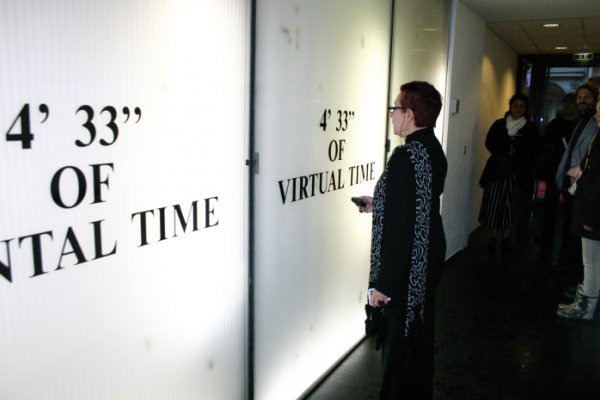"In his 4' 33", John Cage opened a quiet time for sound, any sound, could live in it musically.
In my work 155H 4 '33'' (2,044 spaces of 4' 33''), that will be made as a site specific work for ESC, that caginian module of 4' 33'' is used as a temporal frame to stage an experience of time and space that includes the spectator as an essential part of it.
The French philosopher Michel Foucault pointed out that, in the so-called "relationships of locations", "time appears subordinate to the problem of space as a possible factor of the elements that are distributed in it." In my work, sounds are submitted to measurement of a spatial experience, which brings us to the time when that experience takes place, which is the one of the spectator. The sound material is verbal: numbers, ambiguous words, being these ones also part of the visual elements, which closed self-referential representation that, due to its esenciality, refers to a certain set of mirrors that catches the visitor in its movement.
I take the module of 4' 33'' to set bounds, at a sound and visual level, to all that will happen in ESC along 155H 4' 33'', the time in which will be exhibited the work.
If we divide the whole time of exhibition between 4' 33", we will have 2.044 intervals of 4' 33'' different ones from the others and, therefore, unique, in which ESC will become a big stage in what there will take place continuously such events. In them, visitors stop being spectators and become interpreters of the work with their movements into the space and with the sounds that they will produce in it.
While the Cage's 4' 33'' focused on the non-musical sounds that happened unexpectedly on a precise time, the work 155H 4' 33'' enlarges the strict view of such sounds by placing them as part of a scene that occupies the entire space of ESC and in which are also integrated spatial paths that make visitors / interpreters. Thus the content of the work not only focuses on the time through the sounds that occur in it, but in 155H 4 '33' are integrated the time of the space and the space of time.
Time of the space will be marked by slight boundary marks made after an action of paths in which audio and video recordings were made. There will be Interventions with as visual statements of different concepts of time.
The space of time will be marked by organized sound recordings through a temporary structure that states different seconds and minutes that will pass in each one of the modules of 4' 33'' and that have the function of bar lines of the different sounds that will take place in ESC."
Concha Jerez
Las Palmas de Gran Canaria, 1941. Intermedia Künstlerin.
Sie studierte Klavier am Real Conservatorio Superior de Musica in Madrid, und hat einen Abschluss in Politikwissenschaft an der Universität Madrid. Seit 1991 unterrichtet sie als Dozentin an der Fakultät der Schönen Künste der Universität Salamanca. Seit 1973 bis heute hat sie ununterbrochen zahlreiche Soloarbeiten in Spanien, Deutschland, Österreich, Frankreich, Italien, Dänemark, Schweden, Finnland, usw. realsiert.
Seit 1976 konzentriert sie ihre Arbeit auf das Konzept von Installation als Intermedia-, raumspezifische Arbeiten in einer grossen Bandbreite von verschiedenen Räumen, und erweiterte ihre Aktivität auf Performances zu Beginn der 1980er.
Eröffnung: Samstag, 25.9.2010, 17.00 Uhr
zu sehen bis Sonntag, 17.10.2010
Wirklichkeitskonstruktionen
Die Rauminstallation dient als Rahmen für einen konzentrierten Dialog zwischen ExpertInnen aus Kunst, Bio- und Nanotechnologie, Soziologie und Technik über ihre Methoden und Formen von Wirklichkeitskonstruktion. Wie funktionieren Interpretationsmodelle im Elektronenmikroskop, welche Vorstellungen von Sinnstiftung liegen in partizipativen Stadtentwicklungsmodellen, wie lassen sich Expertisen zurückspielen in das alltägliche urbane Leben?
mit Concha Jerez, Grit Ruhland, Brigitte Bargetz, Seda Gürses, Wernfried Lackner, Institute of Electron Microscopy and Fine Structure Research, TU Graz, u.a., in englischer Sprache
Dienstag, 28.9. und Mittwoch, 29.9.2010, 15.30 - 18.00 Uhr

